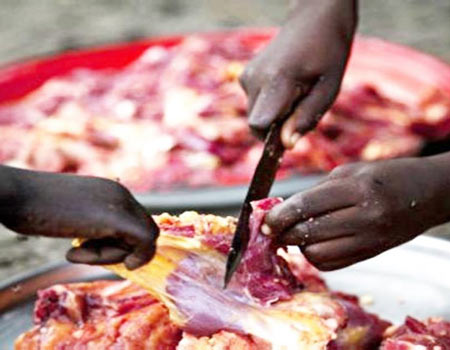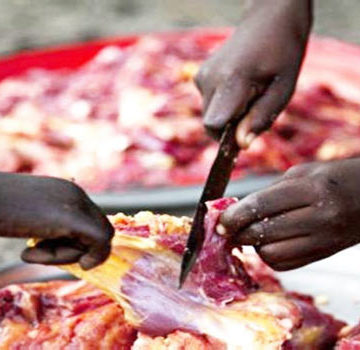ACCORDING to statistics from the National Agricultural Sample Survey, an estimated 72.5 million goats, 19.5 million cattle, 7.1 million pigs, 41.3 million sheep and 28,000 camels were in Nigeria in 2011.
In the same report published by the Premium Times newspaper in 2016, the country also had 974,499 donkeys, 11.6 million ducks, 1.2 million turkeys and 145 million chickens to rank as the first in Africa for livestock production.
On meat consumption, the International Centre for Investigative Reporting quoted an annual consumption of 360,000 tonnes of beef by Nigerians, based on the statistics released by the Federal Ministry of Agriculture and Rural Development in 2015. After some years, one expects an increase in millions and tonnes of livestock production and consumption respectively.
ALSO READ: Armyworms: Why you may not have enough maize to eat this season
There is no gainsaying that livestock accounts for the major source of protein supply for a population of about 200 million and employment for millions of people in the livestock value-chain. Especially in the Northern part of Nigeria where there is a historical and cultural affinity with cattle and goat production, cattle rearing, meat and milk production are a thriving business contributing to social and economic growth in the country. In the South, there are many agro-allied, meat and dairy companies involved in the agricultural value chain. However, what is the real cost of meat production in Nigeria?
The safety issues associated with environmental hygiene in abattoirs occupy the front-burner in major discourses on meat production. Veterinary experts, public affairs analysts and ordinary citizens decry the unhygienic and dangerous state of meat production and consumption, even the associated disease burden in the country.
However, the negative contribution of the meat industry to the overall effects of climate change has not been adequately attended to. You could easily point to oil companies, manufacturing industries and other global emitters as culpable in the global warming blame game, but not stakeholders involved in meat production.
Actors in the meat production process contribute to dangerous environmental and public health challenges with their emission of nitrous oxide and methane; Nigerians are at the receiving end of this emission as air, water and soil pollution associated with meat production combine to worsen the disease burden and soil degradation in the country.
In 2017, reports of forced, unplanned migration with attendant vulnerabilities in the areas of water and food insecurity, and reduced incomes were partly linked to and explained as fulfilment of projections of extreme weather events. Apart from the Boko Haram insurgency, increased environmental degradation has partly triggered and increased domestic and cross-border international migration, especially among pastoralists from the Northern Nigeria, into the Middle Belt, South-Eastern and South-Western parts of the country, leading to conflicts over land ownership and use, violence and deaths.
Where there are millions of each group of animals, greater volumes of methane are produced; in order for cattle to graze, substantial size of forest-land will be sacrificed to produce grasses. Apart from religious and tribal interpretations of the crisis between farmers and herdsmen, there is a climate change factor that is not being addressed.
The North to South movement of herdsmen that started in the 1970s was partly triggered by deforestation, desertification, drought and gradual degradation of the savanna, forcing herdsmen to constantly move in search of water and grasses for their cattle.
This uncontrolled drift means that in the near future, if the situation is not addressed, reported gradual disintegration of the Southern rain-forest and threatened biodiversity will multiply, leading to further aggravation of the tensed warming of the climate.
Also, as these animals move from one place to another overtime, they exert maximum pressure on the ecosystem and constant trampling on the vegetation in those areas cause some imbalance in the composition of the natural ecosystem.
We have not considered the commercial and small scale activities of people who specialise in killing and processing cattle and other animals for sale. Most of these people may not be aware that the firewood, fuel and smoke that they use in large quantities every day emit gases and warm the planet, a dangerous development that needs to be controlled.
Agricultural processes account for the largest emission of methane through livestock production, rice production, production of animal manure and constant release through the mouths and nostrils of major animals such as cattle, sheep, and goats.
If there is an annual release of 80-110kg of methane by a grown cow according to the statistics provided by the Environmental Protection Agency, what millions of goats, cattle, sheep and other animals annually emit should convince us that meat production portends great danger for sustainable management of climate change in Nigeria.
Having established that the global 15 per cent emission of greenhouse gases into the atmosphere through livestock farming could be really inimical to the United Nations’ agreement on reducing emission by taking concrete actions, Nigeria, a signatory to various UN declarations, conventions, agreements and policies on cutting of greenhouse emission, needs to come up with or implement certain policies and actions geared towards estimating or assessing the contribution of the meat and dairy industries to the climate change burden and finding decisive ways or strategies for ensuring that stakeholders in the industries understand their contributions to the emission discourse, agree to drastically cut this dangerous emission, and implement sustainable and climate-friendly meat production strategies.
The newest revelation from the UN is that we all work to keep global warming under 1.50Cif the global sustainability drive will succeed. This calls for a collaboration among the Federal Ministry of Agriculture and Rural Development, the Nigeria Institute of Animal Science, the Miyyeti Allah Cattle Breeders Association of Nigeria, the National Food and Drug Administration and Control, the Poultry Farmers Association of Nigeria, major agricultural settlements and capital-intensive agricultural and agro-allied companies in Nigeria, the Farmers Council of Nigeria and other stakeholders as we partner, debate, discuss, raise policies and implement actions for a drastic reduction in the contribution of meat production to climate change.
Africa has been labelled as the worst hit by climate change and there are predictions that in years to come, severe weather events in Nigeria will result in increased flooding of lowlands, increased rate of malaria invasion, extinction of many endangered species of plants and animals and collapse of biodiversity.
Also, there will be increased shortage in rainfall for agricultural production, leading to starvation and or drought; increased rural-to-urban migration, depletion of household assets, a decline in forest resources and soil conditions, soil moisture and nutrients, serious desertification and loss of lives.
Climate change, according to research, is aggravated by man-made actions like uncontrolled deforestation, increased reliance on organic fuel and uptake of fossil fuels and increased use of land for agricultural and non-agricultural purposes in which meat production takes a giant share.
One hopes that the nation will toe the path of sustainability by taking actions as and when due. Reactionary moves by government and other actors to cushion the effects of climate change do not show that the nation is serious with her promise to implement sustainable, climate-friendly strategies.
As the supposed giant of Africa, Nigeria must rise now to seriously cut gaseous emission associated with meat production by diversifying into and investing in other means of meeting that need. THE TIME TO ACT IS NOW.
Dr Obasanjo Joseph Oyedele is of the Department of Mass Communication, Bowen University, Iwo, Osun State, Nigeria.





